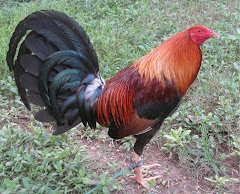
Today, Gov. Kathleen Blanco signed a historic piece of legislation shedding Louisiana's dubious distinction as last bastion of legal cockfighting within the United States.
H.B. 108, introduced by Rep. Harold Ritchie, is a full ban on cockfighting taking effect in 2008.
The bill is complemented by the passage of another law banning gambling at cockfights that the Governor signed last week. S.B. 221, the gambling ban sponsored by Sen. Art Lentini, will take effect on Aug. 15 of this year. While not banning cockfighting outright, it should go a long way toward shutting down cockfighting because gambling is a constant feature of the activity and a cash source fueling the industry.
This one-two punch against Louisiana's cockfighting industry is an overdue but welcome step to halt the barbaric practice.
(Click on image to play video)
"While we strongly preferred the adoption of an immediate ban on cockfighting, the passage of the anti-gambling measure and the delayed cockfighting ban give us a short timeline for the demise of this barbaric activity in the state," says Wayne Pacelle, president and CEO of The Humane Society of the United States. "With the strong new federal law against the practice, cockfighters have little room to maneuver and should voluntarily stop their cruel treatment of animals."
The signing of these bills is just the latest of a recent spate of victories over cockfighting.
In March, New Mexico passed a cockfighting ban, making it the 49th state to outlaw the activity.
Then in May, President Bush signed into law a bill making the transportation of fighting birds or cockfighting implements across state lines or abroad a felony offense.
Also in May, the last two airlines still transporting fighting birds to the Philippines declared they would stop after learning that the shipments violated federal law. All of these actions further isolated Louisiana, and applied pressure on the state to align its policies with the rest of the nation.
The HSUS will continue its efforts to upgrade state laws, to train law enforcement on investigating animal fighting operations and to enforce the state and federal laws against animal fighting.








